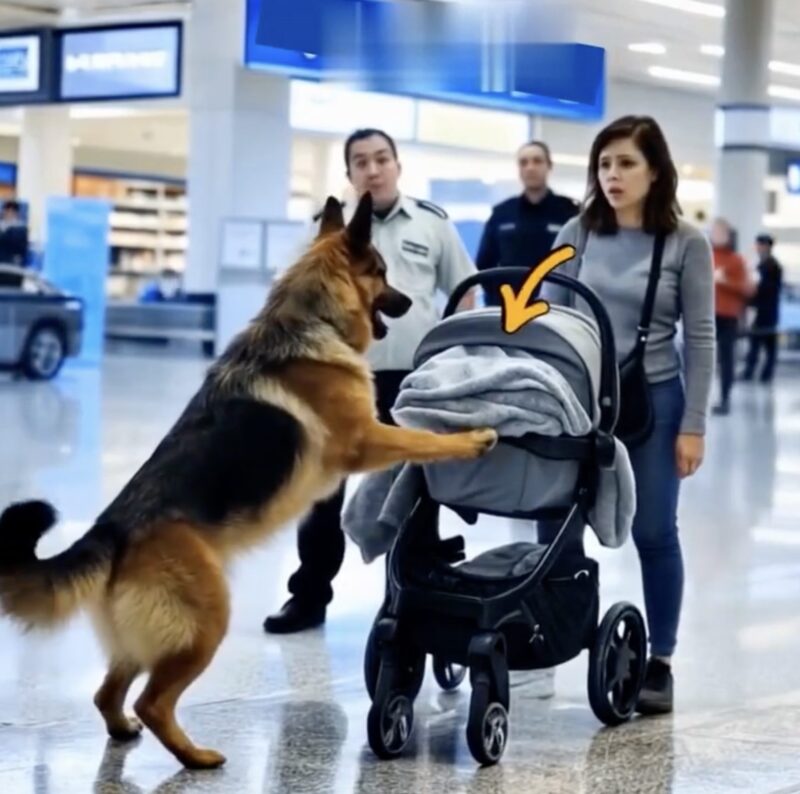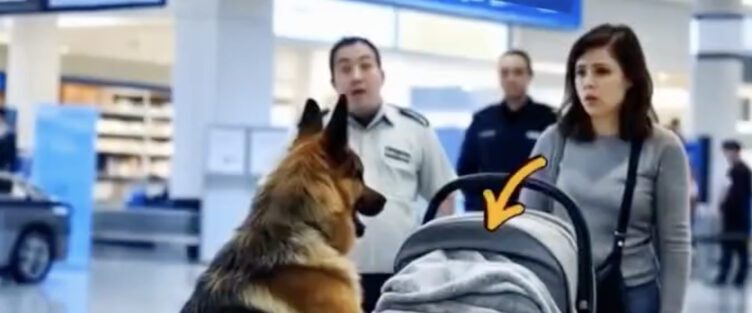Terminal D at the Franz Liszt International Airport throbbed with a strange silence.
The sterile glow of the overhead lights flickered on the glass floor, reflecting the slow shuffle of tired passengers dragging their suitcases to customs.
The only consistent sound was the rhythmic tapping of wheels and the soft murmur of voices, merging into the cavernous noise of the hall.
Everyone looked depressed-red eyes, rumpled clothes, shoulders slumped under the weight of jet lag and impatience. Most of them just wanted to get through the final stretch. But for one man and his canine companion, the day was just beginning.
Officer Tamas Kovacs stood like a statue next to the customs line, watching. I’m always watching.
His face had been etched by years of discipline-harsh, unreadable, weathered like an old stone.
But his eyes were alert, constantly scanning, analyzing the movements of each traveler. Nothing escaped him.
He leaned slightly to one side, preferring a stiff left leg, an old war injury he rarely talked about. But next to him, trotting in perfect sync, was Zora, a German shepherd with the pose of a guardian and the grace of a predator.
Zora was more than a dog.
She was a legend in uniform—three years of service, zero mistakes. Her coat shimmered in shades of jets and embers, and her eyes were incredibly intelligent.
People were whispering about her, taking pictures when they thought no one had noticed. But Zora did not take care of the tree. She wasn’t there to be admired.
She was there to see what others were missing.
And that morning, something caught her attention.
It started with twitch. Pause. The breathing was too long.
Zora pricked up her ears. Her body tensed like a stretched bow. Tamas noticed right away—he always did that. His voice was calm but firm.:
“Zora, the wheel.”

It’s too late.
Zora was already moving, muscles tensed, nose slicing through the air like a blade through a mist. She pushed her way forward, keeping her eyes on the young woman approaching the checkpoint, pushing a wheelchair.
The woman looked… I’m not myself.
Her hands were gripping the stroller too tightly. Her smile was practiced. Her eyes were shifty, not scanning. Hiding something. Tamas’s pulse quickened, a quiet storm gathering beneath the surface.
Then Zora jumped.
Her paw slammed into the side of the stroller. The woman gasped, recoiling in panic. The stroller is tilted, and the blue blanket draped over it slides along the ground.
The child started crying.
But that’s not what made the world stop.
It was a cold flash of steel, sparkling under the infante’s body.
“The gun!” Someone shouted.
And in an instant, all hell broke loose.
People were screaming. The luggage was left in the middle. The sea of passengers fell to the floor, covering their heads. Phones rattled on the tiles like officers flooding the square.
But Tamas didn’t flinch.
You’ve seen worse. Much worse. And Zora—Zora stood firmly beside him, motionless, her gas never leaving the woman.
It wasn’t a mistake.
It wasn’t nerves or a misunderstanding. The gun was real. Hidden under a child, disguised by innocence.
Zora sniffed it out like a ghost slipping through the cracks in the wall.
The woman began to tremble. Her lips moved, whispering something to the child, to herself, to no one. Tears come quickly-guilt, fear, or something darker. It didn’t matter. The truth has already begun to unfold.
And all this can be traced back to Zora.
Tamas remembered when he first saw her-just homeless, abandoned near the barracks, half-starved and shrouded in fog. But he saw something in her eyes. Something that reflected his own: survival, loyalty, the need for protection.
He has a chance at her.
And now, three years later, she has repaid him in the most unusual way.
The police found the gun. The woman wasn’t fighting. In fact, this is not the case.
Whatever her plan was, it collapsed the moment Zora intervened. Her composure shattered like glass under her feet, leaving behind only a shell of a man and a thousand unanswered questions.
The child, oddly enough, stopped crying. Maybe it’s a premonition that the worst is over.
But something has changed for Tamas and Zora.
They had faced danger before. But I never like it. It’s never close to innocence.
That day, amidst the shattered tranquility of Terminal D, two of them crossed the threshold. They were no longer just a handler and a service dog.
They were created on the basis of instinct and trust,
in silence and a Storm.
And nothing will ever be the same again.
